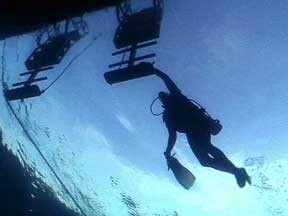Two dive instructors are sitting in a bar and one of them asks the other what working on a live-aboard is really like.
I’m sure just about now you’re beginning to expect a punch line. Or some grand revelation shrouded in misty anticipation. Is it really as good as I imagine it’d be when I stare at those ads in the dive mags every morning before jumping into the shower? Or, please, tell me it sucks so I can keep putting up with my stuffy cube job. Oops. Sorry to the latter gang. Yup. It CAN be great. The all caps CAN is not a typo either. Tell me, have you ever heard of anyone, soap opera characters not included, who actually has the 100% perfect job? Having enjoyed the cushiness of a corporate gig at its best and then living the dream any dive instructor would give their primary reg for, my humble and stoic opinion is there ain’t no job nirvana out there. But there could never be just one punch line to the story. It really depends on your own perspective and what you make of the opportunity. That said; let me be the first one to push you overboard, the first one to whisper in your ear devilish diving temptations. Still there? Come on, go for it, start packing your gear, what are you waiting for!!

Ok, ok. Take your time. Procrastinate a bit. In fact, question your sanity. Besides, the first thing any dive professional contemplating such a pursuit should do is question what it is they expect to get out of such a job before, ahem, diving in. Financial security? Travel opportunities? A good way to meet a lot of people or perhaps even your soul mate? Sure. All that can happen. Well, if you consider financial security to be the fact that you’ll know with fair accuracy how small your pea-size wages will be in return for the super-sized load of hard work you’ll have. The travel opportunities will probably end up being eroded by a well-trodden and monotonous marine path around the same reef system, week after week after week. And, ahhh, the people you meet…chances are they will, at times, leave an imprint in your mind reminiscent of that left by very needy, misbehaved, never-listening, high-maintenance…hmm…pets. Finding a soul mate.

Hey, who am I to burst that bubble, but in my experience it would have been easier to come across my own wonder woman should I have trekked solo and blindfolded throughout the Antarctic guided by a pack of Chihuahuas in wooly sweaters. No, no, I’m not jaded. I actually enjoyed my live-aboard jobs. I even got to love them. But after the initial butterflies and background-playing violins subside, any love affair requires much work and effort. This one is no different. Besides, even paradise has an entry fee. So what could you expect? The boat’s your world. Your only world.
Like any resort out there, live-aboards come in all kinds and levels of luxury. You have the many-star kind with swanky and lush Hugh-Hefner-like robes (with the mandatory note warning you’ll become fish food pâté should you even think of putting them into your suitcase on your way back home) to some that resemble hard core survival camping retreats especially designed for law-troubled young adults. I was lucky enough to be employed by companies with vessels that could roughly subscribe to the first category, and have only heard first person accounts of what it is like to work (read serve hard time) on the last-mentioned category. Your own accommodation, food, work environment and your lifestyle in general will vary greatly according to the boat you’re in. The nicer the boat, the nicer the overall amenities that will be part of your daily living. For example, aluminum boats generally require less maintenance than steel boats. I worked on both kinds. Life on the steel boat was framed by menial, monotonous tasks the maintenance of the boat demanded, like de-rusting, etc. I don’t mind hard work, but when most of that hard work has little to do with diving, dive teaching or learning something new, the experience looses some appeal. If you’re thinking of applying for one of these jobs do a bit of research. Perhaps you couldn’t care less if you camp out at sea and take on the role of underpaid and overworked camp counselor as long as you get to dive every now and then.

Every boat out there is different, and each will be a different experience to work on. Not that you might get a much of a choice, but that’s another story. If you do care about the quality of life aboard the boat beware of misleading placement advise from those dive instructor farms. You know the ones, you’ve seen their ads thrice the times you’ve paged through a dive magazine. They usually care more about the upkeep of their placement numbers, not how swell of an experience you’ll end up having on the rust bucket job they just placed you at. Know what you’re getting into by knowing the boat you’ll be getting on. But you’re a "Dive Instructor". Aha! That’s really the first catch. If you want to work on a live-aboard, doing for a living what you’re passionately addicted to anyway, that’s one kind of baggage you will have to leave behind, the "That’ll be Mr. (or Mrs.) Instructor to you" kind of attitude. There are only two important kinds of people on a boat. The captain and the guest you are serving with an ever-present smile. I’ll talk more about these in a bit, but the important take away is that being a dive instructor, heck, even a course director, is not going to make you very special on a boat.

Running a boat is hard work and the people doing the work are not many. The responsibilities need to be shared. Anybody that’s part of the crew will be expected to lend a hand on all boat-running activities, so if you don’t have any boating skills you really should look into acquiring some solid ones before you get jumpy to jump aboard. Know at least a couple knots, including a bowline. Even some basic boat mechanics will be helpful. Anything that needs to be done on board will make a guest appearance on your job description; from serving tables to washing dishes to painting decks. But don’t worry. You’ll still get a chance to be a super hero. Just this time your logo won’t be that of a spiffy dive Meister all the time. You should see how thankful and admiring a guest is when you’re the one fixing the plugged toilet at 3 am. Donde manda capitan no gobierna marinero. That’s a well-known expression in Spanish that roughly translates as "wherever the captain reigns the sailor has no say". Think fascist, authoritarian rule. That’s the kind of supreme sovereignty your captain will have. This means a couple of things. One, whatever tone the captain sets for the environment on the boat, that’s what will be. Two, there’s little you can do about it. Getting along with people is probably as important to this kind of job as knowing how to swim is. If the social skills required to work on a live-aboard were an extreme sport, it’d be ‘no-wetsuit shark hugging’.
The longer you do it the higher the odds you’ll experience some very abrasive moments. But you might also get better at it. So pick yourself a copy of Psychology magazine or perhaps even check out some valuable tips NLP could teach you.
It’s all about maneuvering into a win-win situation. Time and space. One of the biggest compromises you’ll accept along with the job is the lack of personal time and space. Different boats/charters have different schedules, but most usually go out for a week. That usually means out to sea on Saturday and back to the dock on Friday afternoon, 6 nights later. Your free time usually starts Friday night and ends Saturday very early in the morning. Even getting enough time to email and brag to your friends about the amazing whale shark encounters you’ve had all week can be a challenge. Besides the captain’s beat everyone will be marching to, time and space are the two factors that could end up being the most trying of your live-aboard experience. The interaction with your fellow crew and passengers will surely be affected by the physical space constraints. No matter how lovely anyone may seem to you, when they remain within your personal space too long you’ll eventually want to cut their earlobes off with a dull,crusty dive knife.
So, the ability to deal with the pressures of relating to others while living in close quarters for an extended period of time will probably define how good of an experience you’ll have onboard. On a boat there are usually very few places to hide, underwater and a spacious sense of humor are probably the best. Sleep is a commodity. As you probably guessed by now, you shouldn’t expect to swing on a hammock on the top deck of the boat enjoying the pretty sunsets very often. Chances are you’ll have little time to sleep and every bit of free time you’ll probably use in ways that will help you maintain a smile on your face and a positive attitude to deal with all kinds of requests and answer all kinds of questions from guests. "If I bottle some sea water do you think it’ll stay that nice blue color all the way home?" I swear to you that was an actual question. Kinda charming when you’re well rested, but when it’s the first thing you hear in the morning after you’ve had four hours of sleep, your body is achy because you’re catching another guest’s cold and are expected to suit up in the chilly rain to check on a mooring, the charm is easily lost.

Expect a hard schedule. However, the lack of sleep and hard work will probably be framed by another element to be aware of, boredom. When the guests are diving someone needs to be on deck, looking out for any kind of dive emergency. That’s deck duty and since most operations will expect you to be ready to respond immediately should any of the guests have any troubles, you should plan on leaving your French-learning books at home.
And that new ipod will definitely not get much use at those times, either. Boat life is characterized by moments of intense activity, lulls of intense dullness and long working hours. Good thing stimulating beverages are usually available in a nice assortment of colors and quite plentiful. The customer is always right. Most operations will pay a basic monthly salary plus tips. Tips are really what you’re striving for. So whenever you get to a point where you feel like screaming quadrumvirate-lettered obscenities, don’t. And there will be a time, believe me, when you’ll want to throw a guest into the deep. One of the most surprising occurrences I encountered while working on a live-aboard was meeting people who despite the great, sunny weather, the gorgeous diving, scrumptious food and of course, very pleasant assistance from the crew, would still have an excuse to pout, be miserable and insist everyone joins their mood club. Research (my own) has yielded the sad revelation that some people are genetically indisposed to happiness, no matter how pleasantly narked they could get. And although you might more often meet wonderful people, just remember the social skills as an extreme sport bit. Also that no matter how long the charters might seem, they always end.

Remembering this kept me not only sane and smiling but probably prevented me from criminal activity in a third world country. The Diving. Oh, yeah, you might want to know about the diving. Right. The diving…don’t think you could ever tire of diving? Do you wear sunglasses under your mask because you just can’t wait for the earth to rotate fast enough so you could enjoy a much loved night dive? Well, my friend, work on a live-aboard and you’ll cure yourself of such obsessions. Unless you’re new at this, this will not be a huge revelation, but the Caribbean, generally speaking, is inferior in terms of the kind of diving experience the South Pacific/Asia rim can provide. Even if you do get a job in the Far East though, after a month or two not only will you have made the acquaintance, on a first name basis, of every fish on the reef and their close relatives, the initial excitement of being paid to dive every day will seem as distant as that childhood dream of leading your own mission to Mars. As hard to believe as this notion is, you will come across a few instances when you would probably choose a visit to a mean dentist rather than gear up and dive. Leaving your warm, comfy clothes and post-dinner semi-comatose trance behind to put on a cold, wet suit and jump into sea-wasp infested dark waters will surely test your love for night dives. But, hey, you’re a professional and there are a myriad of
unlucky souls who’d give anything to be in your fins.
Still reading this, huh? That’s the spirit. Ok, here are a few tips that might help you better prepare to get one of these gem (although not perfect) jobs. Be sure to have some solid boating skills. Check with your local coastguard office, they might offer a cheap course. Try and learn some basic mechanical skills as well. Have STCW95 basic safety training. This is an international standards course required for mariners working aboard commercial vessels. Having this will make you a more attractive candidate. There are a few parts to the course, first aid, crowd control and basic fire-fighting being some. This last one was great fun and left me with the utmost respect for fire fighters. Be sure your dive teaching skills are solid, you have a good grip on teaching standards and are attentive to all details when filling out all the required teaching paperwork.
Have a few specialties you are able to teach. Nitrox is by far the most commonly requested, but underwater navigation, deep diving, fish I.D., buoyancy, photo and video are also popular. If there’s a peculiar dive environment in the area you are applying for a job at, be sure you can teach that specialty. For example, be able to teach drift diving if you want to work on a live-aboard that cruises the waters of Cozumel. Develop patience and attention to detail. The monotony of diving the same sites week after week encouraged me to appreciate every site for what it could offer and was rewarded, when accepting such offers, with the capacity to see something I was once blind to. Try to take on photography or video. It’s a great way to keep a record of your experience, the challenge of improving is stimulating and these activities will help you see stuff you usually didn’t. However don’t expect all live-aboard companies to offer you the chance to be the photo or video pro right away. Unless you can say Amos Nachoum’s imagery actually improved as consequence of your tips and you can have him vouch for that, you’ll have to be lucky and/or earn the place.

Some companies, for example, reserve the right to create and sell the weekly video for their captains. They see that as a privilege, and considering one could double the amount of tip money made in a week by adding the sale of several $50 or $60 videos, that’s not too shabby of a privilege. Not all companies are set up in such a way and sometimes the captains are as interested in being in charge of the video as they are on letting any overtly lushed up guest take the wheel and go slaloming in between some protruding coral reefs. If you’re going as far as thinking what to take with you, less is more. Really. Unless you’ll break a teaching standard not having it, don’t take it. One whistle is good, take the lightest bc you have. You’ll be very happy dragging the least amount of gear possible. As it is, you’ll need plenty of space for all your teaching materials.

Surprised? Employers commonly use the leverage they know the job holds. One way they do that is by not spending money on things YOU can spend money on, like teaching materials and slates, for example. Go digital if you haven’t yet. Your first job is the hardest to get. Call all the companies you can. It’s better than email. Find out who’s in charge of hiring. Ask what you could do to become an ideal candidate for a job with them. Ask if there’s a fleet captain you could talk to. Try to meet crew that works on the boats. DEMA is a good place to meet people. Take your resume and caffeinate your charm. Regardless of the compromises, if you like diving, traveling and teaching, this will be an experience you will never forget. And besides, nurturing the dreams of those who wish they could go for it but can’t will be worth all the hard work. Hope you get a chance to live the dream and survive to tell us all about it.
